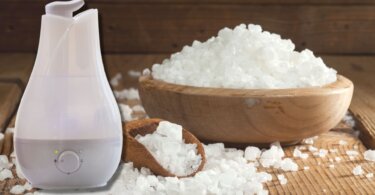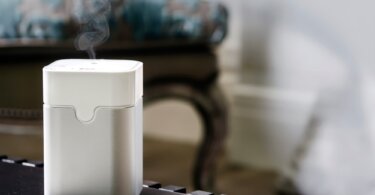Sore throat paired with dry cough and nasal blockage is the perfect recipe for a bad day. You experience pain in the throat while breathing, swallowing, and even talking. The chances are that you’d blame the changing weather or your respiratory health for these allergy symptoms without considering the air you’re inhaling.
Dry air is the major contributing factor to sore throats and bloody noses. When you inhale dry air, the delicate mucus membranes in your nostrils will dry out, and the moisture coating your throat will evaporate. This situation doesn’t feel uncomfortable right away, but it can be a serious health risk if prolonged.
That’s when a humidifier becomes essential for your home, and breathing without it feels difficult. It maintains the optimal humidity levels in your breathing air and ensures your nasal passages are comfortable.
But can you always rely on the humidifier for your sore throat and other uncomfortable respiratory symptoms? Well, that’s tricky because many people hold humidifiers responsible for asthma symptoms and dry throat.
If you’re also confused about whether a humidifier can dangerously increase the level of humidity in your home or you can trust it, you’re in the right place. In this article we will explain if a humidifier can cause a sore throat or if it’s a myth. So, stick around and let us explain!

Can a Humidifier Trigger your Sore Throat?
Let us break it down for you:
During cold weather, the warm air expands, and its moisture content drops below the normal level. When you inhale this air, it directly hits your nasal passage and throat, resulting in dryness. If you closely observe your skin and scalp in winters, you’ll see visible dryness and patching. This decrease in the moisture percentage of your breathing air will result in throat tenderness and pain. If not timely dealt with, you’ll soon come down with a runny nose, flu symptoms, and sinus pain.
But the good thing is a humidifier can reverse this process. The humidity level in your breathing air should be 30-60% because it keeps your nasal passage from drying out. A humidifier will monitor your indoor humidity and propel moisture steam accordingly. This moist air won’t irritate your throat and help you breathe normally.
So, humidifiers don’t cause a sore throat and irritated skin – they, in fact, do the opposite. If you often deal with a sore throat between November and March, a humidifier will help alleviate this situation. However, remember that unclean and dirty humidifiers can be counterproductive. Regular maintenance and cleaning are essential for your humidifier’s effectiveness and your health. Don’t let your steam vaporizer or mist humidifier remain unclean for a long period because it can backfire
How does High Humidity Effects Your Health?
If you often see portable humidifiers around and wonder if they are worth investing in, you’re on the right track. Since your home’s indoor moisture impacts your respiratory health, ensuring that you inhale good-quality air is essential.
The optimal humidity level in indoor air is 30-60%, depending on the weather. However, factors like ventilation, air quality, and the weather significantly impact this moisture content. Your home’s moisture content is likely to drop by half in cold months, resulting in lung infections and respiratory health problems. Luckily, we now have mist humidifiers that maintain a safe moisture level in the indoor air and protect our respiratory health.
A smart humidifier will monitor its surrounding humidity levels and propel steam accordingly. If you live in a dry region, leaving your humidifier on for prolonged periods is smart because, this way, you can always keep dry air at bay. Moreover, if you or anyone else at your home often suffers from viral infections, a humidifier can help them breathe more comfortably.
What are the Potential Risks of Using a Humidifier?
Some people connect a humidifier with the growth of bacteria and dust mites, while others worry if they’ll trigger their allergies. While some of these concerns are valid, some are just myths. That’s why we have listed common environmental and health problems you might face with a humidifier. Here’s what can potentially go wrong with if you use a humidifier:
Physical Injuries
If your humidifier uses hot water to prevent the growth of allergens and airborne dust particles, it can cause some physical injuries. Imagine leaving your humidifier on the central table and your kid accidentally touching it; this situation will be problematic. But the relief is, most of these injuries originate from careless handling, and you can overcome that pretty easily.
Bacterial Infections
Humidifiers are beneficial for improving indoor air, but they are not void of flaws. If you don’t provide your humidifier with proper maintenance and don’t keep it clean, it can trigger asthma and allergy flares. Therefore, it’s wise to consult a doctor before connecting a humidifier with your central air conditioning system.
Mold Growth
Excess moisture in the indoor air is not always good, especially if you live in a humid region. Your humidifier can quickly balance the moisture deficiency, and if you leave it on, it can cross the safe limit. Your home’s walls and ceiling will absorb this excess moisture, resulting in mold and fungal growth.
So, if your breathing air starts to feel heavy, immediately turn off the humidifier and ensure there’s enough ventilation in your home. This mold growth can aggravate asthma flares and breathing conditions if left unnoticed.
Heavy Indoor Air
Even if you don’t face anything serious, i.e., runny nose or sinus pain, while using a humidifier, its excess use is never smart. Your indoor air will quickly get heavy, and inhaling it will feel uncomfortable, mainly if you live in a moist region.
How to Ensure your Humidifier is Always Beneficial?
Humidifiers put a great fight against dry air; if your throat often feels dry and irritated, a humidifier can fix this problem. But to enjoy the maximum benefits of a humidifier, you must use it correctly. Many users ignore the well-being of their humidifiers and end up with extra problems. Here’s what you can do to enjoy the maximum benefits of your humidifier:
Regular Cleaning
Dirty humidifiers play a major role in respiratory infections because they propel pollutants into the air you breathe. If you keep your humidifier clean and change its filter according to the package instructions, it will only do good things for your home. The dirty reservoirs of bacteria lie in your humidifier’s filter, and you must eradicate them before it’s late.
Related article: How to Prevent Mold in a Humidifier
Distilled Water
Using tap water in the humidifier is another contributing factor to the negative effects of humidifiers. Since tap water contains multiple minerals and microorganisms, it can compromise your indoor air quality. Distilled water is the only safe option for humidifiers because it doesn’t contain potentially risky minerals and microorganisms.
Related article: What Kind of Water is Best to Use in a Humidifier?
Optimum Usage
You might be compelled to use the humidifier 24/7 during dry months, but it’s not the best approach. Once your indoor air reaches the ideal humidity level, you should turn off the humidifier. Excess moisture can cause breathing issues, trigger sinus pain, and instigate mold growth in your home.
Thorough Ventilation
If you keep the windows and doors closed at all times, the humidifier’s moisture has no escape, and it can cross the bearable limit. That’s why ensuring that your home has sufficient ventilation is wise; this quick step will prevent mold and bacteria growth.
Summing Up
The central humidifier will ensure your indoor air is never dry or uncomfortable. Whether you struggle with a sore throat in winters or your stuffy nose becomes a constant because of the weather, a humidifier will always be helpful. Since dry air can trigger multiple allergies and asthma flares, maintaining the optimum humidity level in your home is smart.
Using a humidifier is safe and will not cause a sore throat. Especially if you use distilled water and regularly clean your humidifier, it will only do good things for your health. However, we always recommend consulting a doctor about a humidifier if you have a respiratory or breathing condition. Don’t slack with your humidifier’s cleanliness and monitoring because the air propelling from it directly enters your nasal passages.
So be careful with the moisture contents in your home to keep sore throat, nasal blockage, and uncomfortable breathing at bay!
Make sure you check out: The Best Humidifiers for Hard Water
FAQs
Can I leave the humidifier on all night?
Although it’s better to run the humidifier for 2-3 hours in one go, if your indoor air is extremely dry, you can leave it on all night. The recommended humidity level is 30-60% for indoor air; you should turn off the humidifier after this limit.
Is sleeping with a humidifier on good for you?
Yes, a humidifier’s cool or warm mist will relax your throat muscles and make your sleep more comfortable. It is also noted that people experience less snoring when they sleep with the humidifier on. However, if you have allergies or asthma, this can be counterproductive.
Related articles:
Can You Catch a Cold From Air Conditioning
Can Dogs Get Sick From Air Conditioning





Leave a Comment